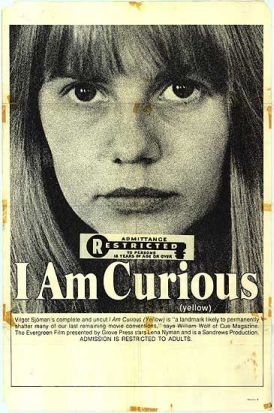- I Am Curious (Yellow)
Infobox Film
name = I Am Curious (Yellow)

caption =
director =Vilgot Sjöman
producer = Göran Lindgren
writer = Vilgot Sjöman
starring = Vilgot Sjöman
Peter LindgrenLena Nyman Börje Ahlstedt
Chris WahlströmMarie Göranzon
music = Bengt Ernryd
cinematography = Peter Wester
editing = Wic Kjellin
distributor =Grove Press
released =Sweden :9 October ,1967 United States :10 March ,1969
runtime = 121 min
language = Swedish
budget =
amg_id = 1:24002
imdb_id = 0061834"I Am Curious (Yellow)" (original Swedish title: "Jag är nyfiken - gul") is a 1967 Swedish
film directed byVilgot Sjöman and starringLena Nyman as a character named after her. It is a companion film to 1968's "I Am Curious (Blue) "; the two were initially intended to be one 3½ hour film. [Vilgot Sjöman, "I Was Curious: Diary of the Making of a Film" (Grove Press , 1968)] The films are named after the colours of theSwedish flag .Style
"Yellow" was a landmark film that helped define the emergent change in Swedish film of the 1960s. Like a
French New Wave film, the movie usesjump cut s and its story is not structured in a conventionalHollywood way. It also contains documentary elements; for example, it features a brief appearance byDr. Martin Luther King, Jr. who is interviewed by Sjöman about his views on civil disobedience. This interview was filmed in March 1966, when Dr. King andHarry Belafonte were inStockholm to start a new initiative for Swedish support ofAfrican Americans . [Sjöman, published screenplay (Grove Press, 1968)]Censorship
The film includes numerous and frank scenes of
nudity and stagedsexual intercourse . In one particularly controversial scene, Lena kissed her lover's flaccid penis. In 1969, the film was banned in the Commonwealth ofMassachusetts for being pornographic. However, after proceedings in theUnited States District Court for the District of Massachusetts ("Karalexis v. Byrne", 306 F. Supp. 1363 (D. Mass. 1969)), theSecond Circuit Court of Appeals and theSupreme Court of the United States ("Byrne v. Karalexis ", [http://supreme.justia.com/us/396/976/case.html 396 U.S. 976 (1969)] and [http://supreme.justia.com/us/401/216/case.html 401 U.S. 216 (1971)] ), the Second Circuit Court of Appeals found the movie not to be obscene. [ [http://www.filmint.nu/?q=node/31 I Am Curious / Jag är nyfiken | Film International ] ]Influence
The film's title was the inspiration for:
* Curious Yellow, a virtual world in
Jeff Noon 's novel "Vurt "
* "The Simpsons " episode "I Am Furious Yellow "
* The "Get Smart " episode "I Am Curiously Yellow"
* The Fall’s 1988 album "I Am Kurious Oranj " (which in turn inspired Lee and Herring's popular comedy character "The Curious Orange", portrayed byPaul Putner )
* A fluorescent chartreuse color named "curious yellow", whichChrysler Corporation offered as an optional-at-extra-cost "High Impact Paint (HIP)" color on its 1971 Plymouth cars.
* The "Superman's Girlfriend Lois Lane" issue "I Am Curious (Black)" whereinLois Lane becomes a Black woman for a day
* The "Melrose Place " episode "I Am Curious Melrose"
* The "Moonlighting " episode "I Am Curious... Maddie"
* The "Ed, Edd n Eddy " episode "I Am Curious Ed"
* Curious Yellow is the name of a network worm in "Glasshouse" byCharles Stross , based on the name of the worm described in this paper byBrandon Wiley : [http://blanu.net/curious_yellow.html Curious Yellow: The First Coordinated Worm Design] .
* In her book "You'll Never Eat Lunch in this Town Again", producerJulia Phillips mentions a film script entitled "I Am Furious (Yellow)". The script was a comedy about a woman who becomes enraged whenever she sees the colour yellow. Phillips mentions that she was considering the project as a starring vehicle for Madonna. It was never made.
* In an episode of "The Lucy Show ",Jack Benny (who was once a spokesman forJell-O ) tells Lucy that he's working on a film entitled "I Am Curious, Jell-O".
* In an issue of "Mad Magazine ", a movie theater advertises a film called "I Am Lecherous (Purple)"Reception
Initial reception to the films were hostile with
Vincent Canby of "The New York Times " stating that, "I'm not very fond of this sort of moviemaking, which tries to disarm conventional criticism by exploiting formlessness as meaningful itself," [ [http://movies.nytimes.com/movie/review?res=9802E2D81439E63BBC4951DFB366838B669EDE&partner=Rotten%20Tomatoes "The New York Times"’ review of "Blue"] ] but more modern critics have begun to look at the films as classics.References
External links
*
*
* [http://www.criterion.com/asp/release.asp?id=180&eid=283§ion=essay Criterion Collection essay by Gary Giddins]
* [http://caselaw.lp.findlaw.com/scripts/getcase.pl?court=us&vol=396&invol=976 "Byrne v. Karalexis"]
Wikimedia Foundation. 2010.
